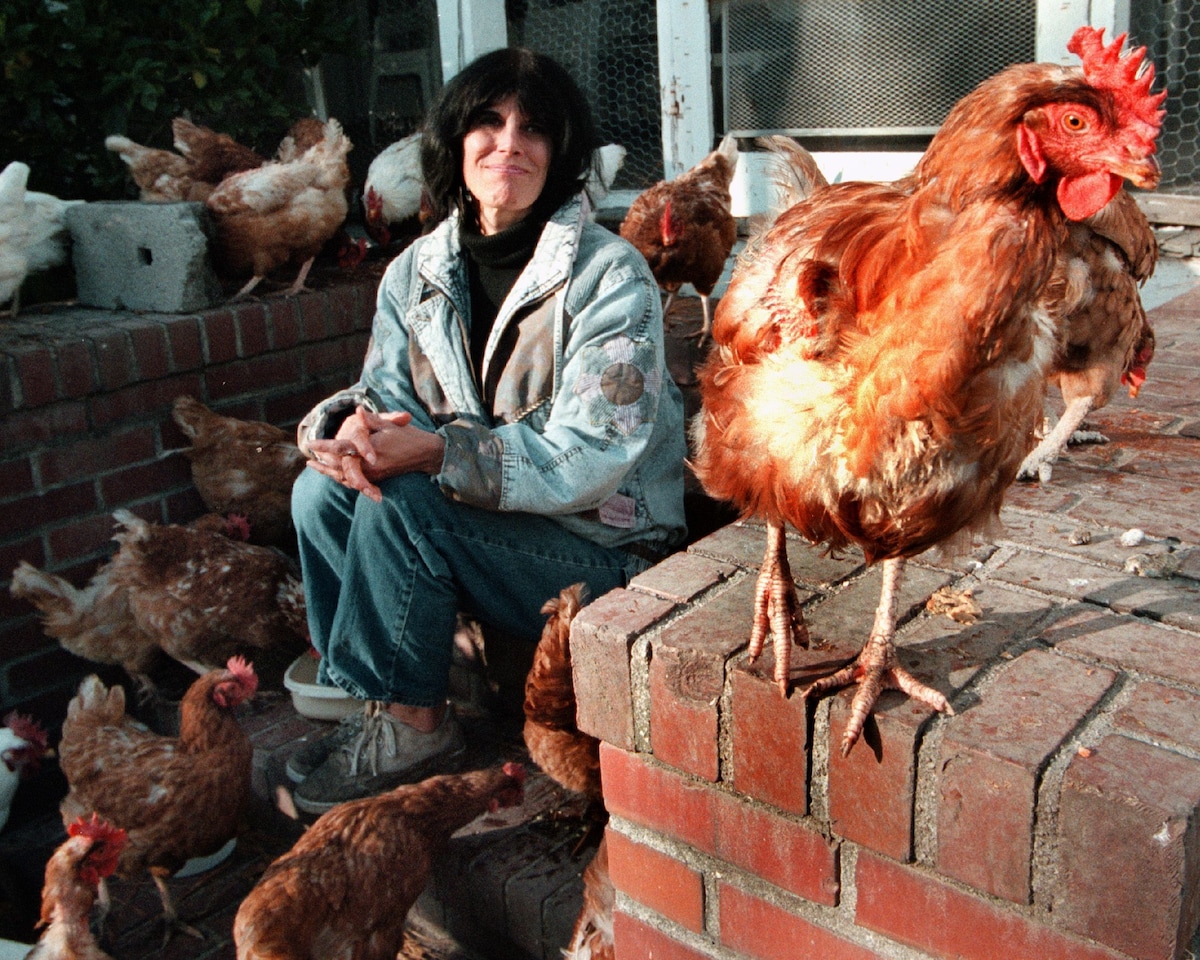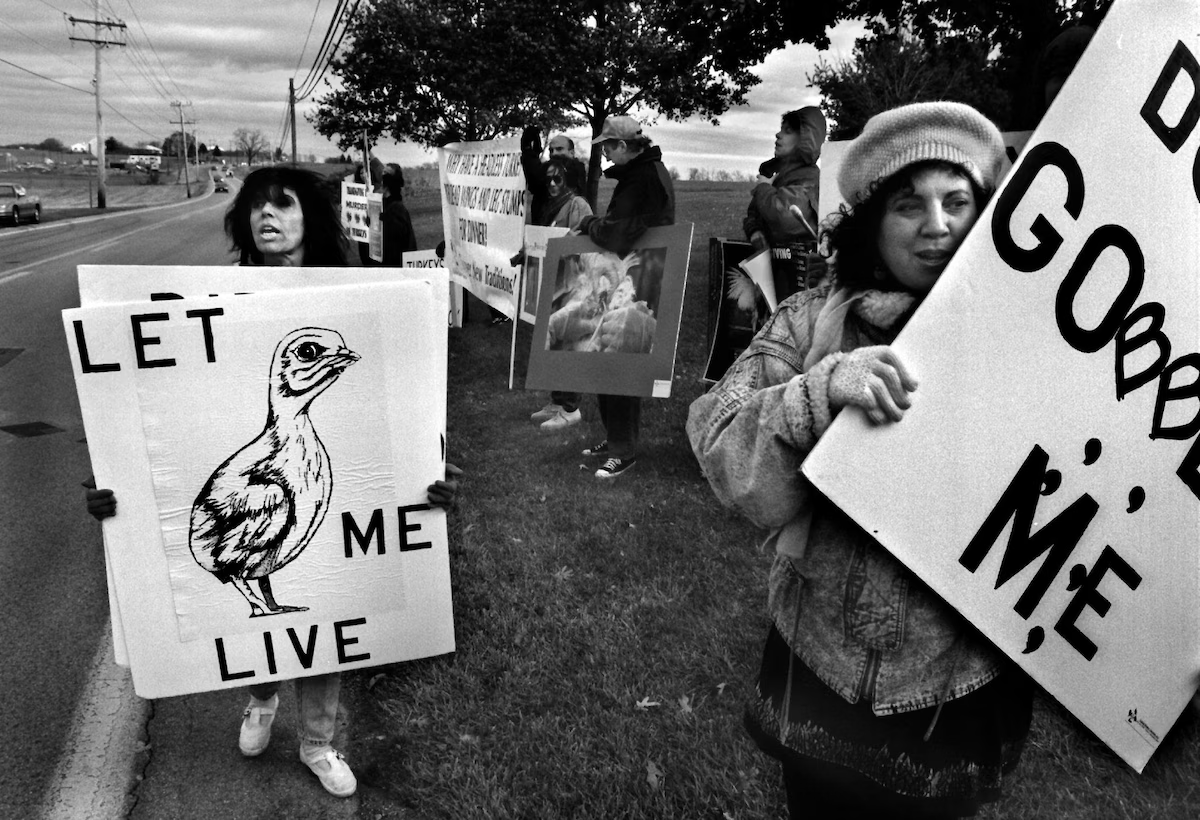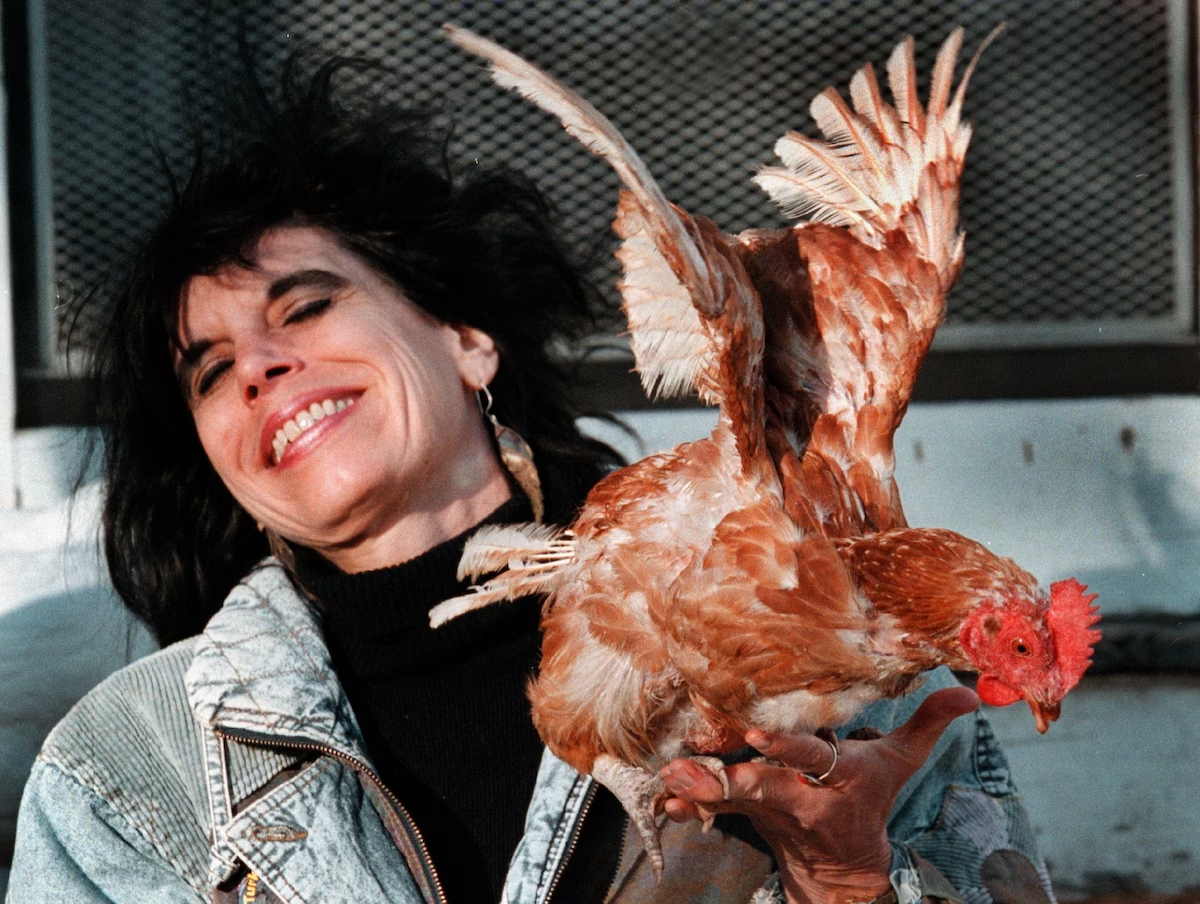Karen Davis, animal rights advocate who spoke for the birds, dies at 79
Published in The Washington Post
Before becoming a full-time activist, she taught English at the University of Maryland. She later turned her home into a sanctuary for chickens and other barnyard fowl.
By
Harrison Smith
November 8, 2023 at 7:26 p.m. EST

Animal rights activist Karen Davis with her favorite red chicken, Ringlet, in
1999. It was one of 104 chickens that she kept at her Delmarva house,
including five that had “indoor privileges.” (Frank Johnston/The Washington
Post)
Karen Davis, an academic turned animal rights activist who campaigned on behalf of chickens, turkeys and other barnyard fowl, arguing for the dignity of “nonhuman animals,” as she put it, while promoting veganism, crusading against the modern poultry industry and turning her home into a sanctuary for chickens, died Nov. 4 at her residence in Machipongo, Va. She was 79.
Her death was announced by United Poultry Concerns (UPC), a nonprofit organization she founded in 1990 and led until her death. The group did not cite a cause, but Ms. Davis had cancer and had been in declining health after a fall in 2021, according to an obituary on the website Animals 24-7, which published many of her essays.
“She was pretty private about her illness,” Franklin Wade, a UPC vice president, said in an email. “She didn’t want people worrying about her and interrupting her to see how she was doing. She had work to do. She never slowed down.”
“In her mind,” he added, “you just find what you were meant to do, and you do it.”
For Ms. Davis, that meant organizing, writing, lecturing and protesting on behalf of domesticated birds, including the more than 9 billion chickens slaughtered each year in the United States.
Ms. Davis jokingly referred to herself as “that crazy chicken lady” but was unapologetic in campaigning on behalf of animals, gaining national attention through her efforts to overhaul a global food system that she likened to a form of mass murder.
“I spend my days with domestic chickens and turkeys, birds that have long been denigrated as stupid, despite ample evidence to the contrary,” she wrote in a 2005 letter to The Washington Post, responding to an article about avian intelligence. “Just watch a hen calculate how to speed to her perch at night to avoid a certain attentive rooster in the way, and you know that a smart chick is looking out for her own interests.
“The day may come,” she concluded, “when to be called a ‘chicken’ or a ‘turkey’ will be rightly regarded as a salute to a person’s intelligence.”
Ms. Davis “made countless people think for the first time about who birds raised on farms truly are,” Ingrid Newkirk, president of People for the Ethical Treatment of Animals, wrote in a blog post Monday. “Her work helped humans recognize that chickens, who are among the most abused individuals on the planet, have thoughts, feelings, and hopes for a pain-free existence, just as we do.”

Ms. Davis at her home chicken sanctuary. She rescued some of the birds from
overturned poultry trucks and adopted others from school hatchery projects.
(Frank Johnston/The Washington Post)
Although Ms. Davis had been intermittently involved in the animal rights movement for years, she believed that she would spend the rest of her life teaching English before her encounter with a crippled, abandoned hen that she and her husband named Viva.
Ms. Davis was 41, living in a rented bungalow near Potomac while completing a dissertation at the University of Maryland, when she found the hen one day in 1985, left behind in a coop that belonged to her landlady.
The rest of the flock had been sent to slaughter. Ms. Davis brought the last remaining bird inside and attempted to nurse her back to health, making a bed for the small, white chicken near the stove.
A veterinarian diagnosed the hen with splay leg — a common problem among chickens bred for the poultry industry, according to Ms. Davis — and recommended that the bird be euthanized. She was buried in a corner of Ms. Davis’s backyard.
“Getting to know Viva completely changed the course of my life,” Ms. Davis later told The Post.
She turned to activism, leaving the University of Maryland after 12 years as a teacher to compile vegan recipes, publish a quarterly magazine for UPC and write books including “Prisoned Chickens, Poisoned Eggs” (1996), a scathing takedown of slaughterhouses and processing plants, which she considered incubators of suffering and disease.
While poultry companies insisted that their chickens were killed humanely, Ms. Davis scoffed, insisting that they were missing the point. “What’s the best way to slaughter babies?” she would ask, rhetorically.
Ms. Davis campaigned against the practice known as forced molting, in which farmers withhold food from hens to produce more higher-quality eggs. (It was banned by United Egg Producers, a U.S. trade group, in the mid-2000s.) She also targeted events that demeaned or mistreated fowl, such as an ostrich race at the Prince William County Fair in Virginia and a “chicken roping” contest in Wyoming.
She organized Thanksgiving season demonstrations outside turkey farms, leading dozens of activists in chants of “Don’t gobble me,” and traveled to New York City to protest the use of live chickens in kapparot, a penitential ritual practiced by some Orthodox Jews, in which a chicken is swung in a circle and slaughtered between Rosh Hashanah and Yom Kippur.
Ms. Davis could be persuasive, especially when she introduced skeptics to one of the dozens of personable chickens that lived at her home in the Delmarva Peninsula.
Ira Glass, host of the radio show “This American Life,” told late-night host David Letterman in 2007 that he decided to become a vegetarian after visiting Ms. Davis at her chicken sanctuary, following a letter-writing campaign in which she had urged the broadcaster to end an annual “Poultry Slam” segment that featured jokes and stories about turkeys, geese and other holiday season staples.
At times, however, her uncompromising approach to animal rights could be alienating and abrasive.
Martin Rowe, executive director of the Culture & Animals Foundation, noted in a tribute that “she was unafraid to offend or court controversy,” as evidenced by the title of her third animal rights book, “The Holocaust & the Henmaid’s Tale: A Case for Comparing Atrocities” (2005). The book argued that there were significant parallels between the murder of 6 million Jews during the Holocaust and the mistreatment of animals at factory farms.
“Timidity and reticence were not what the chickens, ducks, geese, turkeys, and other domesticated birds she dedicated so many decades of her life to defending needed,” Rowe wrote. “Their plight demanded someone who was not afraid to speak out, and that person was Karen.”

Ms. Davis, left, protesting outside of a turkey farm in 1996. (Michael
Williamson/The Washington Post)
The oldest of four children, Karen Elizabeth Davis was born in Altoona, Pa., on Feb. 4, 1944.
Her mother was a self-employed French teacher, and her father was a lawyer who became the county district attorney. He was also an avid hunter, to the dismay of Ms. Davis, who said she would interrupt family dinners as a teenager to argue against the killing of pheasants and rabbits.
“There was a lot of yelling, some hitting, no social consciousness concerns,” she told The Post in 1999, looking back on her upbringing.
Ms. Davis suffered “a psychological crisis” while at Westminster College in New Wilmington, Pa., where she studied Russian and German history while pursuing a sociology degree. She said she became obsessed with Nazi death camps and the Soviet Gulag, fixating on the suffering of innocent people, and tried to kill herself after her freshman year. She dropped out and moved back home, taking a job at a clothing store.
Eventually she returned to school, graduating in 1968 from Lock Haven State College, now Lock Haven University of Pennsylvania. She went on to do graduate work in English literature, receiving a master’s degree from Shippensburg State College (now Shippensburg University of Pennsylvania) in 1980 and a doctorate from the University of Maryland in 1987.
While studying for her PhD, she met George Allan Cate, an English professor who shared her interest in Victorian literature. (Her dissertation was on the novelist and poet Thomas Hardy.) They married in 1983, and he went on to serve as the first vice president of UPC. They later divorced.
Ms. Davis, who is survived by her three brothers, moved to the Delmarva Peninsula in the late 1990s, settling in a bastion of the American poultry industry. At the time, the area was producing 3 billion pounds of chicken a year, a figure that has since increased to more than 4.4 billion pounds, according to the Delmarva Chicken Association.
The growth of factory farms seemed only to increase Ms. Davis’s commitment to her cause. Once, The Post reported in 1999, she received a letter from a skeptic who insisted that she would never be able to end the animal cruelty she railed against. She replied, “There’s nothing you can do but as much as you can, in your allotted lifetime.”

Ms. Davis with one of her chickens, Ringlet. (Frank Johnston/The Washington
Post)